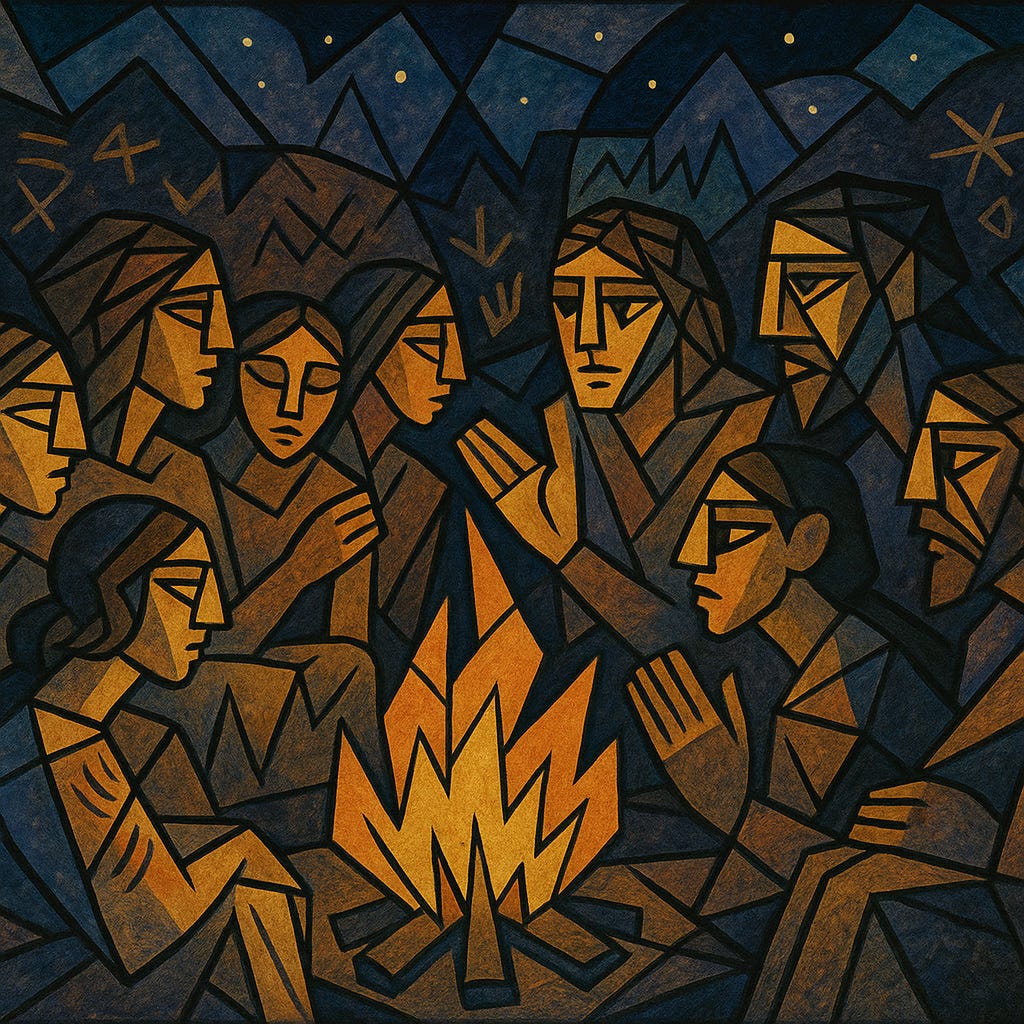My wife and I like a fire. Despite our conscientious attempts to reduce our carbon footprint, we’ve installed a new wood-burning fireplace. We also enjoy evenings around a backyard fire pit when the weather is right. There’s something inviting about gathering around the flames. The smell of wood smoke, the pop and hiss of sap, the way the light flickers across faces — all of it seems to draw out something ancient in us.

Fire invites imagination and conversation. Sometimes it’s about the day’s mundane details, but more often, as the fire burns low and darkness surrounds us, our talk turns deeper — toward memories, hopes, griefs, and the kinds of questions that don’t have easy answers.
I’ve been reading research by anthropologist Polly Wiessner on firelight conversations among the Ju/‘hoansi Bushmen in southern Africa. During the day, their talk focused on practical matters — hunting, gathering, everyday survival. But at night, gathered around a fire, the tone shifted dramatically. Conversations turned to stories, songs, and moral reflections. It’s not a stretch to think this was true of our ancient ancestors who first learned to control fire. Fire changed the content of their discourse, and with it, perhaps the structure of their social world. This pattern of transformation —mundane to mythical, survival to meaning — feels as old as humanity itself.
I’ve also just read Richard Wrangham’s Catching Fire, which has deepened my appreciation of how fire shaped not just our culture, but our biology. Wrangham argues that cooking wasn’t the result of already-large brains — it was the catalyst that made them possible. By softening food, cooking reduced the time and energy our ancestors had to spend chewing and digesting, and those savings could be redirected to fuel bigger brains. But more than just fueling our bodies and brains, fire extended the day and brought people together in new ways. It became a site not just for calories, but for community — where symbolic thinking, storytelling, and culture could take root.
I'm knee-deep in writing Part III of The Spiritual Journey of Homo Sapiens, which is called “Thinking.” And I’m struck by how central fire is to that episode of my story. As our ancestors adapted to life primarily on the ground, fire became essential for safety and survival, keeping predators at bay during the night. But just as importantly, it brought people together. The hearth was humanity’s first classroom, its first chapel, its first stage.
These gatherings weren’t only practical — they were transformative. Our brains evolved not just to solve problems, but to learn from others. Around the firelight, early humans didn’t simply pass time; they passed on knowledge. The fire became the center of an emerging system of cultural evolution, in which behaviors, beliefs, and technologies were transmitted not genetically but socially. Imitation, storytelling, and instruction took root there, allowing ideas and innovations to be shared and improved across generations. This kind of learning from others — what cognitive scientists now call “cumulative culture” — became one of the defining features of human life. Like the other developments I’m describing in the book, there are hints and precursors of it in other species, but culture in humans became something very different. And it seemed to really get going around a fire.
I think back to the bonfires of my youth group camp meetings: how they fostered moments of deep spiritual reflection and an intense sense of community (and if I’m honest, sometimes a bit of groupthink too). The flickering light, the warmth, the feeling of shared vulnerability — they combined to create a powerful atmosphere for bonding. There’s something about that warm circle of light in the midst of darkness that makes it easier to speak from the heart and to feel that you’re part of something larger. It’s not hard to imagine our ancestors feeling much the same, even as their stories were more about mammoths and spirits than about college admissions and altar calls.
Just like I enjoy being in an ancient cave where people expressed themselves artistically, or being in an ancient village where the first hints of our modern societies were taking shape, I like to sit at a fire. It’s the same technology that was used hundreds of thousands of years ago. In its warmth and flickering light, I feel connected to the deep past of our species — and that at a much smaller carbon footprint than travelling to some other part of the world (at least that’s my rationalization for continuing to burn things!).
Have you experienced something similar — moments around a fire that have sparked meaningful reflections or conversations? I’d love to hear about the ways firelight might have illuminated your own spiritual journeys.



Another beautiful and inspiring post, Jim. I share all those feelings and memories about campfires, except in my case it wasn't a Christian youth group, but a communist camp, where I first saw and learned to love an open fire. No spirituality there, more often stories of working class revolts and the oppression of the masses. But the atmosphere was the same, and being human, other stuff crept in, like ghost stories, or wondering about the stars (which I also saw for the first time; not a lot of stars in Brooklyn). And of course, later, girls and all that came with that. I have always had a fireplace in any house I lived in (not the apartments, though) and I still love to make a fire, and just watch it, while letting the flames and sparks clear away my mental debris, and allow my soul to hear the small still voice of our Lord. And sometimes, (more rarely recently) even come across a shiny new idea.
It sounds like the book is going to be fascinating -- I shall eagerly await its completion!